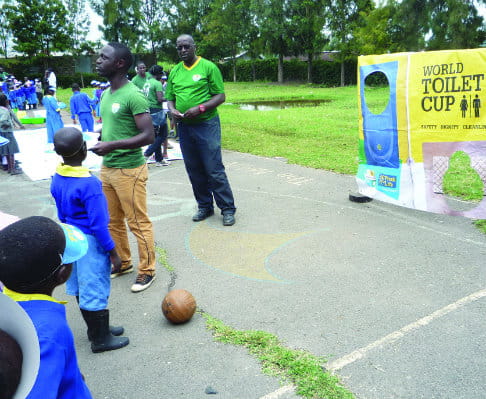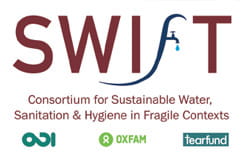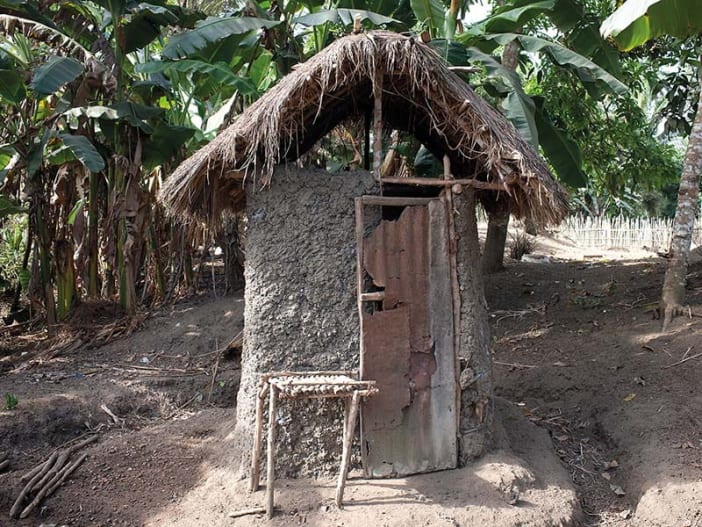As with many things, when it comes to approaches to changing hygiene behaviour, one size does not fit all. A method that works in one context is unlikely to have the same results in another.

Articles
What works best? Different approaches to changing hygiene behaviour
As with many things, when it comes to approaches to changing hygiene behaviour, one size does not fit all. A method that works in one context is unlikely to have the same results in another.
2015 Available in English, French, Portuguese and Spanish

From: Hygiene and sanitation – Footsteps 97
How behaviour change happens, the importance of handwashing and how to make soap
The SWIFT Consortium is led by Oxfam and includes Tearfund and the Overseas Development Institute (ODI) as global partners, Water and Sanitation for the Urban Poor as global associate, and many implementing partners in Kenya and the Democratic Republic of Congo (DRC). SWIFT is bringing together organisations of all shapes and sizes to encourage hygiene behaviour change in Kenya and the Democratic Republic of Congo.
The advantage of being part of a consortium is that members can pool their expertise and their experiences of what has and hasn’t worked in the past. And involving local authorities, civil society groups and others makes it more likely that activities will be sustainable, as they will be based on common objectives. The process of working together can help to deepen mutual trust.
Learning from experience
One SWIFT member delivered a successful WASH programme (a series of projects on water, sanitation and hygiene) in seven fragile states, including DRC, from 2007–2012. It focused on building capacity through conducting hygiene promotion in communities, establishing school health clubs, training community volunteers and making numerous radio broadcasts. By the end of the project, the targets had been met or exceeded. SWIFT learnt from the success and planned its own activities accordingly.
Changing hygiene behaviour in DRC
When communities in rural DRC were presented with resources such as latrine slabs in the past, without any health and hygiene education to explain their purpose, the slabs were left unused and overgrown, because villagers did not understand the importance of using latrines. A new approach was needed.
In rural areas of Maniema, North Kivu and South Kivu provinces, SWIFT is working to encourage behaviour change through the Villages et Ecoles Assainis or ‘healthy villages and schools’ programme, which is supported by UNICEF and the Ministry of Public Health. The ‘healthy villages and schools’ programme builds on the Community-Led Total Sanitation (CLTS) approach (see page 10), which aims to stop open defecation. CLTS was piloted by Tearfund in six villages in Maniema province in 2010 with great success. The ‘healthy villages and schools’ approach is led by the community with the support of a facilitator trained by a SWIFT member. It is based on a step-by-step process of village mobilisation.
The village first forms a managing committee to conduct a survey of the state of water, sanitation and hygiene practices. It draws up an action plan in consultation with the community, the government public health team and SWIFT’s implementing partner. The partner provides support in putting the plan into action, including training ‘community motivators’ in hygiene awareness and other health issues, providing materials for information, education and communication, and training Water User Committees, which are responsible for the collection of fees for maintenance costs (simple repairs, the fencing of water points, the cost of labour to clean out tanks, the replacement of taps, and eventually the replacement of PVC pipes).
The village has between six months and a year to upgrade its toilets, dig its rubbish pits, organise protection of its water points, and hold sufficient sessions on hygiene to help community members develop the habit of hand washing. After that, the managing committee conducts another survey to assess whether the ‘healthy villages and schools’ goals have been reached. The goals include a significant improvement in the use of hygienic latrines and that at least 60 per cent of the community wash their hands before eating and after using the toilet.
Community Health Clubs
Also in rural areas, SWIFT is piloting Community Health Clubs with the support of Africa Ahead. Membership is voluntary, free and open to all, with between 50 and 100 people in each club. Community Health Clubs provide an opportunity for discussion, so the group can arrive at decisions together.
Members take part in weekly, two-hour training sessions on a number of health and hygiene promotion topics, such as the safe storage of drinking water, or making soap to ensure ready availability. Each week they are given practical assignments, such as digging a refuse pit, or making a dish rack to dry dishes off the ground. These are monitored, including through home visits, and members receive stamps and certificates for attending sessions and completing tasks.
Hygiene education for children in Kenya
In rural areas of Turkana, Marsabit and Wajir counties, SWIFT is using the CLTS approach in addition to School Health Clubs, a hygiene-promotion programme for children.
This programme uses the Children’s Hygiene and Sanitation Training (CHAST) methodology endorsed by Kenya’s Ministry of Health, and involves interactive learning sessions with children that include puppet shows, role plays, poetry, games, songs and other creative ways of communicating hygiene messages such as the importance of hand washing with soap.
Similar methods are used in urban environments. When SWIFT implementing partner Sanergy installs a ‘Fresh Life’ toilet in a school in one of Nairobi’s informal settlements, it provides a day of ‘edutainment’, a combination of education and entertainment (see box). The toilets, which are easy to maintain and include hand washing stations, are bought by schools for children to use. The waste is collected by Sanergy on a regular basis and converted to organic fertiliser and renewable energy.
Mass media campaigns
In Kenya, in the urban informal settlements of Nairobi, BBC Media Action is working with local radio stations to develop public service announcements based on the strong popular culture found in these slums. This creative process involves using humour, music and drama to spur people to think about, discuss and act on issues around hygiene and sanitation behaviour.
In the rural northern counties, BBC Media Action is supporting local radio stations to create memorable and locally relevant WASH programming through a participatory on-site training approach. Ideas are developed and then tested with groups to check whether they appeal to the target audience. As large parts of northern Kenya have limited access to radio, media output produced by the partner radio stations will be adapted into outreach materials for use by field staff to further disseminate hygiene information.
What will we learn?
The SWIFT Consortium is funded with UK aid under a ‘Payment by Results’ contract. SWIFT did not receive a grant. Instead, funds are released when results are verified by an independent organisation. In addition, outcomes must be sustainable. So the programme must not only prove that it has reached a certain number of people with hygiene promotion messages by the end of 2015, but must demonstrate in 2018 that there is a significantly higher number of people practising hygiene behaviours such as washing their hands with soap.
This continued monitoring makes the programme challenging, but it will provide very useful insights into which approaches have worked best in which contexts. Will Community Health Clubs prove to have a greater impact than the ‘healthy villages and schools’ approach in DRC, for example? Will mass media campaigns using popular culture see lasting change in the slums of Nairobi? And will ‘edutainment’ show itself to be an effective way of encouraging improved hygiene practices among children? By 2018, we will have more learning to share about which approaches may work best in different contexts in future.
Emma Feeny is the Learning and Communications Support Officer for the SWIFT Consortium. For more information, see www.oxfam.org.uk/swift
If you would like to follow the progress of the SWIFT programme, sign up to receive our newsletters by contacting [email protected].

Photo: Francesco Rigamonti/Oxfam
World Toilet Cup
To mark World Toilet Day in November, SWIFT partner Sanergy and social impact organisation WASH United organised a range of activities for children in Mukuru, an informal settlement in east Nairobi, Kenya. The children took part in a giant board game, rolling a dice and pretending to wash their hands at the right moments to find the ‘Hand washing Champion’. They also competed in a football-themed ‘World Toilet Cup’, which required them to kick a brown ball into a ‘latrine’ (motto: ‘every poo needs a loo’).
The SWIFT Consortium aims to provide safe, sustainable water and sanitation, and improve hygiene practices in DRC and Kenya. It is funded with UK aid from the British people.

View or download this resource
Get this resource
Get this resource
Share this resource
If you found this resource useful, please share it with others so they can benefit too.

Subscribe to Footsteps magazine
A free digital and print magazine for community development workers. Covering a diverse range of topics, it is published three times a year.
Sign up now - Subscribe to Footsteps magazine



